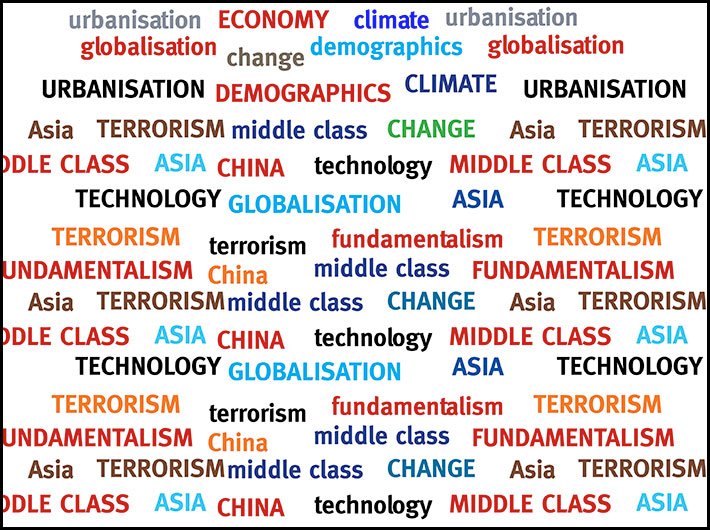It’d be truism to say that the world of the future is being shaped right now. Which are the big factors that can help figure out what would be the shape of things to come? Harinder S Kohli, founding director and chief executive, Emerging Markets Forum, Washington DC, has edited a voluminous and scholarly work, ‘The World in 2050: Striving For A more Just, Prosperous and Harmonious Global Economy’, in which he identifies ten megatrends that can give an idea of how the world will be 34 years from now. They are:
Demographics
“All regions of the world will have aging societies and shrinking work force (except for Africa and the Middle East.)”
Urbanisation
“Asia and Africa will face an avalanche of urban migration between now and 2050, with China, India, and Nigeria alone likely to add a billion people to the urban population.”
Globalisation and international trade
“Continued globalisation of trade and investment will lead to an even more intertwined world.”
Globalisation of finance
“Continuation of the past trend toward larger, more global, and integrated but also more volatile financial markets will create more opportunities and could act as a strong positive force for economies – both developed and developing – with well-functioning financial systems.”
Rise of a massive middle class
“By 2050, 84 percent of all people in the world may belong to upper or middle class.”
Competition for finite natural resources
“The fundamental question is whether the Earth can sustain the demands of the resulting 4 billion or more new upper and middle class consumers if they choose to replicate the current lifestyles of Western consumers, or would people throughout the world agree to move to a different lifestyle that would demand far less from the Earth?”
Climate change
“This is possibly the greatest global common threat of our generation.”
Technological change and breakthroughs
“Progress in this area offers tantalizing prospects of solutions to many current and emerging societal problems…”
Historic rise of emerging market economies (EMEs)
“Between now and 2050, China and India by themselves may account for half of the net growth of global GDP.”
Emergence of fundamentalism and non-state actors
“Violent non-state actors pose potential serious threats to global security and rule of law.”
The book, published by Oxford University Press (OUP), presents long-term perspectives on the economic and social outlook of the world by 2050, focusing on cross-cutting intergenerational issues that often get overshadowed by the short-term crises and political preoccupations of the day. A joint effort of a multidisciplinary, multicultural team of 26 authors from 12 countries, this book is an “analytically rigorous exploration of the future of the global economy and its societies”.
The book had a global launch in Paris earlier, and was launched in India on Tuesday by minister of state Piyush Goyal in New Delhi. The event, co-organised by OUP and Indian Council for Research on International Economic Relations (ICRIER) also saw a discussion with TN Ninan, chairman and editorial director of Business Standard, Montek Singh Ahluwalia, former deputy chairman, planning commission, and Arunabha Ghosh, CEO, Council on Energy, Environment and Water.
Chaired by Isher Judge Ahluwalia, the discussion was lively and scholarly in equal measures.
Introducing the book, Kohli said, “2050 may look far away but it is not. Think of 1985: sure you can remember the year vividly. 2050 will be here before you know. … India will be 100 years old as a free nation; we need to think where the country should be then.”
As he highlighted the ten megatrends, Isher Judge Ahluwalia quipped, “One big mega trend is missing: the dynamic role women can play if the society changes itself … quality of life depends on their contribution.”
Minister Goyal termed the book as a “truly remarkable piece of work”, which has “set my mind thinking on a lot of things”.
Though appreciative of the volume, journalist Ninan chose to pay the devil’s advocate and pointed out that the 2050 projections were quite linear, without factoring for “disruptions”. Calling Kohli an optimist, he offered several hypothetical scenarios that can undermine any long-term forecasts. Montek Singh Ahluwalia, however, argued that the book was not optimistic; the essays compiled in it point out problems and seek solutions. Kohli later clarified, “We have projected four scenarios. We do have projected a pessimistic scenario, which shows Asia coming to a halt. But not counting, say, a nuclear war, there are hard trends which are likely to continue…”
